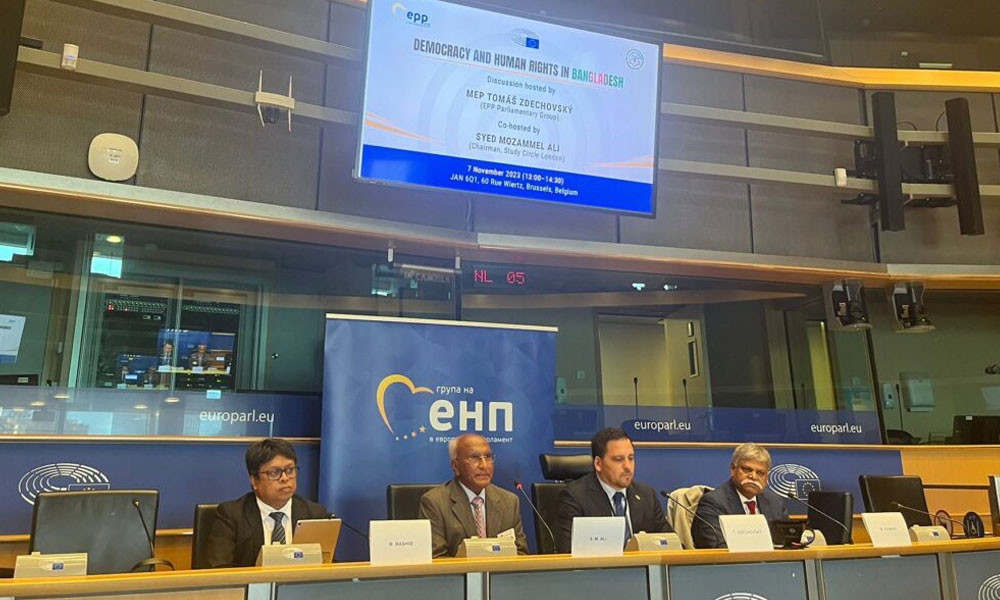Diplomatic correspondent
Published:2023-11-09 19:28:51 BdST
Democracy In BangladeshEuropean Parliament hosts conference on eve of elections
“Bangladesh achieved remarkable growth during the last two decades. Referred to as the South Asian tiger, the country has strong trade relations with the EU,” said Tomáš Zdechovský MEP (EPP, Czechia) in a conference titled “Democracy and Human Rights in Bangladesh”, which took place in the European Parliament on November 7th.
“A constructive and balanced partnership based on mutual trust and respect is needed between the two sides now. There is confidence that democracy will prevail in the upcoming elections in Bangladesh, which is seen as a symbol of democracy”, he added.
The co-host of the event and Chairperson of Study Circle London Syed Mozammel Ali stated: “According to the 2023 Global State of Democracy Report, almost half of the 173 countries around the world suffered a decline in at least one key indicator of democratic performance in the past five years due to reasons, such as the cost-of-living crisis, climate change and Russia-Ukraine war. Bangladesh is no exception being a populous country with 112 million voters”.
“Of course, there should be a balance between human rights and security, and like Western countries, the Bangladeshi government is dealing with security forces misusing their power through judiciary processes. It takes hundreds of years to install genuine human rights and democratic traditions and there is good progress in Bangladesh”, he went on.
Referring to the 11 Islamic parties out of 47 political parties being registered by the Election Commission, Ali commented: “If the Western powers are not careful, they will risk pushing the country into the hands of fundamentalists”.
Ending on a positive note, “the recent Global Gateway Summit was a vote of confidence in the Bangladeshi government and such assistance would not have been given if the EU didn’t have confidence in the current government”, he affirmed.
Rayhan Rashid from the International Crimes Strategy Forum stressed that “Bangladesh was party to all major international human rights conventions, including the Rome Statute of the International Criminal Court, while sheltering 1.2. million Rohingya refugees from Myanmar.
“Disinformation is a big challenge for democracies, which shall be countered by fact-checking, engaging with all stakeholders and investigating lobbying money and the purpose behind”, continued Dr. Rashid.
Next, he underlined the importance of not cherry-picking one set of human rights (i.e. political and civil rights) over another (i.e. social, economic and cultural rights, such as primary education, universal pension and maternity leave scheme, Covid-19 recovery and women empowerment) and taking a holistic approach while evaluating the human rights situation in Bangladesh.
Mizanur Raman, former chairman of Bangladesh Human Rights Commission, explained that Bangladesh proclaimed its independence in 1971, in a bloody independent war where 3 million lives were lost, to ensure equality, social justice and human dignity for the Bangladeshi people.
“Being a product of human rights, this country cannot be anything but human rights-friendly”, he argued. Reminding delegates of the killing of the father of the nation, Sheikh Mujibur Rahman (pictured right), in August 1975.
He also highlighted that the Bangladeshi law duly imposes content-based restrictions in line with cultural exception clauses in international conventions when it comes to disrespecting the founding father of the nation and the values of the Liberation War.
Unauthorized use or reproduction of The Finance Today content for commercial purposes is strictly prohibited.


